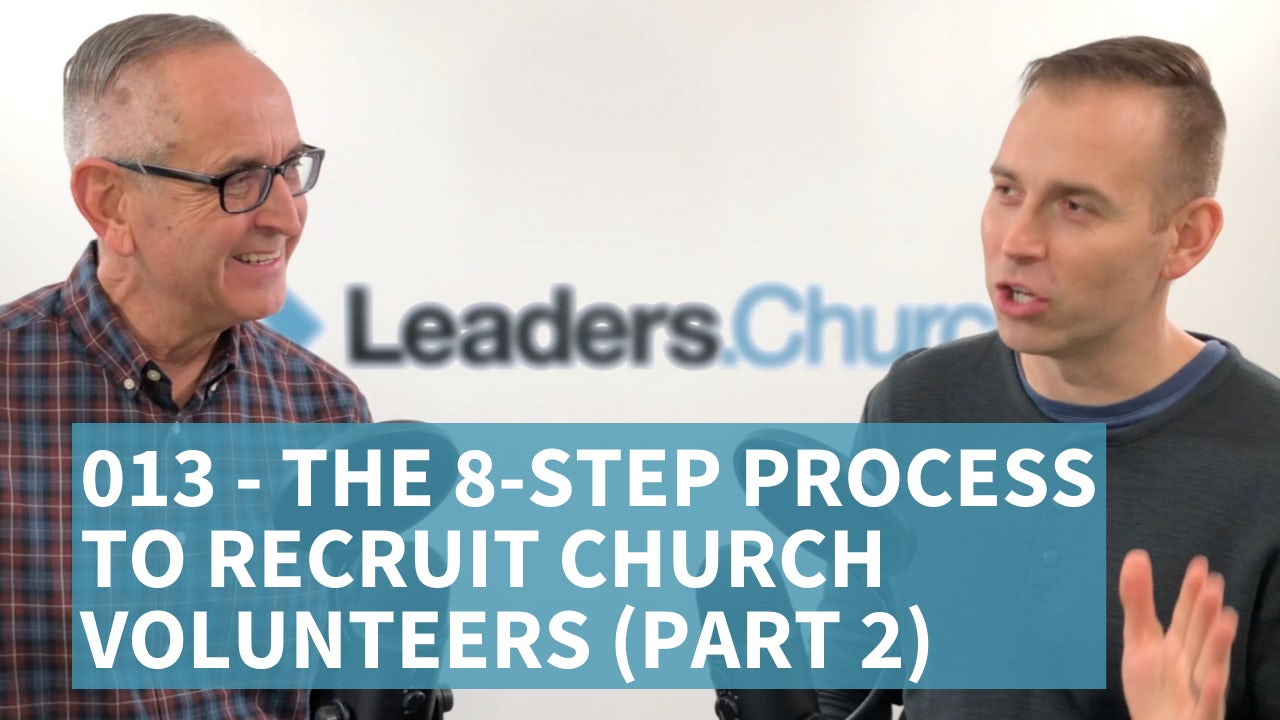013 – The 8-Step Process to Recruit Church Volunteers (Part 2)
What’s in this Episode?
It’s not very fun to gain a new volunteer only to lose an existing volunteer, but that’s exactly what happens in ministry often. Two steps forward, one step backward and sometimes one step forward and two steps backward. The only way for churches to get off the hamster wheel is to build a volunteer pipeline that continually produces more and more volunteers. So in this episode, we’re going to continue our discussion of the eight step process for recruiting church volunteers. Here is that 8-step process.
Read the Transcript
Jonathan Hardy 0:30
Several years ago, I was overseeing all the life group ministry at James River Church and I always remembered every summer would come around, and it was recruitment time, because I knew that I had to get more small group leaders, life group leadersm, ready to go for the fall because the fall was our biggest push of the year, as you know, and that was our big time for us to get as many new life groups started as I could. But here’s what I knew to be true: I knew that many people were going to be quitting over the summer. And so I also, not only had to find new people to start new groups, I had to replace the lost leadership of the groups that currently existed. They would take a break over summer, then one thing led to another and they were like, “oh, we’re gonna take a break,” and you know, and that would just happen over and over and over again. And so we had to make sure that we had an ample amount of new leaders ready to go. So how did I do that? Well, I have what I called a recruitment report. And basically, it was my recruitment list. It was this list of people that I had on a spreadsheet that I would talk to regularly and if they didn’t want to lead at one point, I’d throw them over to, you know, I’d have dates and I said, okay, well, I’ll follow up during this date range. Then the next go around, I’d see where they’re at and just kind of keep in touch with people to be working it at all times.
Jonathan Hardy 1:42
And that’s what we’re talking about today as it relates to the eight step process to recruit really any church volunteer, whether it’s a life group leader, small group leader, nursery worker, kids worker or whatever it is, you have to make sure that you are following the process that’s going to be most effective in getting people off the sidelines and in the trenches with you. And that’s why we want to continue our discussion from the previous episode, Episode Number 12, about the eight step process for recruiting people.
Part One Recap:
Jonathan Hardy 2:10
And I want to just recap those from the previous episode real fast, the first thing we talked about was to pray and think, second thing was to contact the prospect. Third thing was to communicate vision and mission. And the fourth thing was to talk about the prospect. So if you didn’t hear the the first four of the eight step process in Episode 12, go back, listen to Episode 12, because that’ll help give more context as we continue today, because they really build on each other. They’re sequential in nature. And so it’s important for us as we then look at step number five today that we have already done the first four steps in the right order. So that way, we’re ready to go. So that’s kind of the framework for today’s discussion. And we’re going to cover the last four steps that you have to follow when you’re recruiting church volunteers. So with that being said, Dick?
Step #5: Talk About Opportunity, Not Need
Dick Hardy 2:56
You bet. So, you’ve done those four. Now you’re meeting with the person. When you’re doing this, talk about opportunity, not need. People will respond to an opportunity. Opportunity says positive. Opportunity says yes for the future. Need is like, “oh my goodness I got to keep this boat floating,” and you don’t want to start that way. You you want them to feel up. We talked in the previous episode about how you want their head nodding and you want them to feel that way and you set that up this way so now you’re actually talking about it. You communicate opportunity which is up and not the sense of need, being desperation.
Jonathan Hardy 3:43
That kind of reminds me of just giving. You know whenever you say, “oh well we need to replace the carpet or we need this or we need that,” well no one wants to give to that but when they have an opportunity to give to something like, you know, awesome…
Dick Hardy 3:55
Yeah that’s like, “oh! Future, missions, opportunity, new initiatives.”
Jonathan Hardy 4:01
Then you’ve got these higher end donors who say yes, I’ll give to that.
Dick Hardy 4:06
Yeah. I’m not going to fix your broken plumbing, but I’ll give to something big like that. And that’s the way you want to talk with your volunteer. Because what you’re asking of them is something of very high value. And this is how this fits in for everyone all the way through. Okay, what’s the next thing, Jonathan?
Step #6: Do Not Ask For A Commitment
Jonathan Hardy 4:24
Okay, so this is a little counterintuitive here. And this is one of those things where you wouldn’t think to do this because you’re maybe desperate, you might be just ready to go and you hope they’re ready to go. The sixth step is not to actually ask for a commitment yet. Do not ask for a commitment.
Jonathan Hardy 4:28
Wait, now you’re recruiting, but don’t ask for a commitment?
Jonathan Hardy 4:45
I know that’s what I’m saying, we’re rocking the boat here today. We are rocking the boat. No, you really don’t want to ask for the commitment yet. What do you want to ask them at that moment? At that moment, what do you want to ask them to do? Pray about it. You want them to pray about the opportunity. Again, not need, the opportunity. You’re praying about the opportunity. And you’re going to to be praying to, saying, okay, now that we’ve talked now that we’ve had this discussion, you’ve kind of laid the foundation, you’ve talked about the opportunity, they may even be like, yes, I’m in, I’m on. And I know that I’ve had this before. Well, before you say yes, for sure, I want you to go and I want you to pray. And in the same way, I’m going to go back and pray now that we’ve just had this discussion to determine is this in fact, the right fit? And you’re going to be looking and saying, okay, God, is this what you want me to do? So both parties, volunteer, pastor or whatever role you are as a ministry leader, you need to be praying, and you need to be asking this prospective recruit to be praying as well. Don’t ask for the commitment right now. Ask them to pray first.
Jonathan Hardy 4:46
Even though you want it right now.
Jonathan Hardy 4:48
I know… You’re like, “I needed it! I needed you last week.” Well, I know. You’re going to be okay. You made it this long. Pray. You can’t go wrong with prayer.
Dick Hardy 5:56
And if you’ll do that, you’ll actually get a volunteer that will last long longer with you. By the way, if the volunteer won’t pray, you don’t want him.
Jonathan Hardy 6:03
Yeah and you have to go into it knowing this is the long term gain, and it’s easy to just want that yes right away, but if you want long term retention, which we will be talking about throughout the, the Church Tips episodes, if you want retention, then you need to play this right on the front end, and it’s okay. It takes a little longer, but you’re gonna have them for way longer than if you just jump quickly, and then they quit couple months later.
Step #7: Meet a Second Time
Dick Hardy 6:32
Exactly, exactly. The next one is to meet a second time. So you met the first time you didn’t ask for the commitment. You have said, Okay, let’s pray. You tell them at that point, you say well, we both prayed, and you communicate to your prospective volunteer that they… (assuming the Lord says this to you. I’m not trying to put words in the Lord’s mouth) but assuming that this was your sense, you say you are the kind of person that I believe the church needs in this position. Now you notice the words I use there. I did not say you are the person. If you say you are the person, you’re creating a wrong pressure on them, because like, what if the Lord didn’t say that to them? So if the Lord didn’t say that to them, then either I’m lying, they heard it wrong, or the Lord’s confused. None of those are good. So you tell them that this is the sense that you had that they’re the kind of person to fit. And then ask them what the Lord is saying to them. Now I know what you want to hear, what you want to hear is, “that’s exactly right, the Lord has said this.” And then you’re going, “hooray!” And you’re going to have that if you’ve set this up right. There’ll be a certain number of times, you’re going to have that. You’re also going to have cases where people are going to say, I don’t know pastor. Oh, You know, we just moved or you know, my wife just started a new job, the kids are in Little League, and on and on. And here’s what you’re going to hear: the negative part of you is going to hear wah wah wah wah, excuses excuses, and it might be, but you can’t get all worked up over that, you have to know that you’re taking the right steps. Now, if they say yes, then good, then you jump right in and you say, okay, we’re going to start our initial orientation training on Thursday. And so Thursday night, we need you. Or Saturday morning, we need to have here. But if they say no, or if they’re hesitant, don’t pressure them. Because if you pressure them, you’re going to get a short term commitment. They may say that they’ll serve, say for a year. Two months into it, they’re going to quit. Don’t pressure them. Take them at that point, and move them back to the beginning of the process and say something like maybe the timings not right. In almost all cases people say yeah, pastor the timing’s not right. Okay. Hey, you know, here, it’s July. Maybe I should call you know, November, December, January. Call me in January. Okay. Put it in your tickler file. Call them in January. And then when you do that, you’re dying. You’re dying inside because you need this volunteer like now, but I’m just telling you, long haul, he referenced the long game. This is the long game. You’re going to score and have better volunteers last longer if you’ll do that.
Dick Hardy 7:08
I want to interject to that it’s important to really just recognize that… You want to make sure you throw out that carrot, well carrot’s probably not the best word but like you said, where, maybe November December is going to be a better time rather than just cutting off and saying, okay, hey, well, thanks for considering. You got to keep keep the carrot out in front to where they say, okay, you’re planting a seed that I’m going to be contacting you again.
Dick Hardy 9:27
This is not over.
Jonathan Hardy 9:39
This is not over yet. And that’s where I think a lot of times we get messed up. It’s like, oh well, we tried, we cut it off, we’re done. Okay, well, and then you literally are starting back from scratch. But if you say well, maybe I’ll follow back up in November, December, or something like that, then you kind of just created a “to be continued” in this scenario.
Dick Hardy 10:14
It keeps the conversation going.
Jonathan Hardy 10:15
Yes, it keeps conversation going. And in the meantime, hopefully you’re doing some things to just keep that relationship going with them. And that way, you’re just front and center of mind and you don’t just get pushed off and like, “okay, well, I’m not thinking about it anymore.” So but that’s so important.
Dick Hardy 10:30
And when you contact them in November, December, here’s the way you lead off. Well, not the first word, but you say, “Hey, remember, we were talking last July about this and this and this? I’d love to just be able to touch base with you and get together and just kind of see what your status is these days.”
Step #8: Start All Over
Dick Hardy 10:45
And that opens the door then for the extensive conversation, and that’s really the fourth part that we’re talking about today or the eighth part of this whole thing, which is you’d start all over. So you’ve put it back in the front of the pipe. line, the beginning of the pipeline. And now you’re going to start this process all over again. Yeah. Are you gonna repeat? Yes, you’re gonna repeat things over and over. But that’s exactly the way it works.
Recap:
Dick Hardy 11:09
So, if you look at these four that we talked about today, let me just give you a recap. So we did four last time, four today. Talk about opportunity, not need, do not ask for a commitment in your first meeting, meet a second time where you do ask for the commitment, and then you start the process all over again. So if you’ll take these four and the four from the previous episode, you’re going to see good things happen as you recruit your church volunteers.
Jonathan Hardy 11:38
Yeah, follow this eight step process. This is going to be massive in helping you. Again, this is the long term play, but it’s the best play because it’s going to give you the retention for the long haul, rather than just putting a bandaid on the wound right now just to get the slots filled. That’s not what you’re ultimately doing. And our job as ministry leaders is to equip the saints for the work of the ministry. We’re not there to equip them to, you know, fill a slot for a couple weeks until they don’t want to do it. It’s the long term play of discipling people. And so this eight step process, we’re calling it about recruiting volunteers. But really, it’s an eight step process to equip the saints. I mean, that’s really what the bottom line of what this is. And so you’ve got to make sure that you follow these steps carefully, so that way you are setting yourself and the ministry up for the greatest success you can. And I would mention too, if you haven’t yet taken our Five Day Leadership Challenge, this is a great way for you to be growing and investing in yourself, again, for the long play, because you’re helping yourself take the steps now that you need to take that’s going to position you and the church for greater days ahead. And so that’s why we’ve been telling you about the Five Day Leadership Challenge for pastors. I want to encourage you to take it. It’s five days, 15 minutes a day. It’s free. One video per day for you to invest in you at greater levels to help your leadership go to the next level. All you have to do is go to Leaders.Church/challenge. Again that’s Leaders.Church/challenge. You can sign up today and start today if you want, and you’ll be off and running for the five days. And then finally, don’t forget to subscribe to the podcast or the YouTube show, just hit the subscribe button wherever you’re watching or listening to this. And we’ll look forward to having you get further notifications of when the next episodes are coming up. Anything else?
Dick Hardy 11:59
You know, I want to reinforce the Five Day Leadership Challenge. You’ll be a better recruiter, because you’ll be better. As you get better. You’re better at all these things. We’re talking about recruiting here and you may feel like “I’m not a very good recruiter.” You’ll be a better recruiter, if you’ll grow as a leader yourself.
Jonathan Hardy 13:36
So there you go. All right. Well, hey, thanks so much for being with us. We’ll see you next time.









